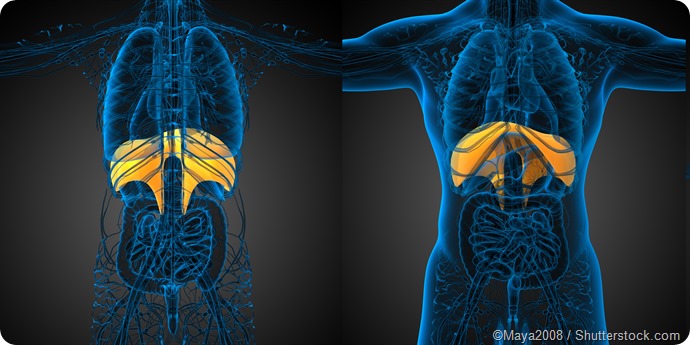Hiccups occur as a result of the diaphragm suddenly involuntarily contracting. The diaphragm is the layer of muscle that separates the chest and abdominal cavities and plays an important role in controlling breathing. Tightening of the diaphragm causes the vocal cords to suddenly close, which results in the characteristic “hic” sound.

Illustration of diaphragm (yellow) in the body.
Hiccups are very common and affect almost everybody at some point in their lives. Often they occur in the absence of any trigger, although short episodes of hiccups have been linked to a number of causes such as drinking alcohol, eating large quantities of food, drinking fizzy or hot drinks, smoking, eating too quickly and becoming excited, stressed, or scared.
Chronic hiccups
Hiccups generally pass after a few minutes/hours or occasionally, a day or two. In some cases, however, they can last for an extended period of time. Episodes that do not pass within two days and last for up to one month are referred to as “persistent” and in the rare case of them lasting for even longer than one month, they are referred to as “intractable.” The longest episode of hiccups that has even been recorded lasted for 60 years.
Hiccups that recur over long periods are also referred to as “chronic” and depending on how long chronic hiccups last, people may suffer from disrupted sleeping or eating patterns. This can lead to exhaustion, dehydration, and weight loss.
Causes
Nerve damage or irritation
The underlying cause of chronic hiccups is often unknown and the condition is not thought to be inherited, with most cases occurring sporadically in individuals who have no family history of the problem. The most common cause of chronic hiccups is nerve damage or irritation. More specifically, the vagus nerve or phrenic nerve may be affected, which are nerves that serve the diaphragm. Examples of problems that may affect these nerves include the following:
- Laryngitis
- Gastroesophageal reflux
- Growth in the neck such as a tumor or cyst
- A hair touching the eardrum
Disorders of the central nervous system
A health problem that affects the central nervous system can interfere with the body’s ability to control the hiccup reflex. Some examples of these problems include the following:
- Multiple sclerosis
- Stroke
- Encephalitis
- Meningitis
- Tumor
- Traumatic brain injury
Metabolic disorders
Some examples of metabolic disorders that are associated with the development of chronic hiccups include:
- Diabetes
- Kidney disorders
- Liver abnormality
- Electrolyte imbalance
- Fever
- Uremia
- Hyponatremia
- Hypocalcemia
Drugs
The use of certain drugs is also associated with chronic hiccups and examples include:
- Anesthesia
- Short-acting barbiturates
- Steroids
- Tranquilizers
Other health problems
Further examples of health problems that are associated with chronic hiccups include:
- Those that cause irritation to the diaphragm such as pneumonia, hiatal hernia, pleurisy, and pericarditis
- Gastrointestinal diseases
- Psychological conditions such as hysteria or shock
Diagnosis and treatment
A doctor can usually diagnose a case of chronic hiccups based on symptoms, but a full physical examination may be required, along with a range of blood tests and imaging studies to establish the exact underlying cause. Treatment then depends on the cause and may include the following:
- Muscle relaxants
- Anticonvulsants
- Sedatives
- Analgesics
- Stimulants
In rare cases, medication may not be sufficient to resolve chronic hiccups and surgery may be performed to block the phrenic nerve, which controls the diaphragm.
Further Reading
Last Updated: Feb 26, 2019